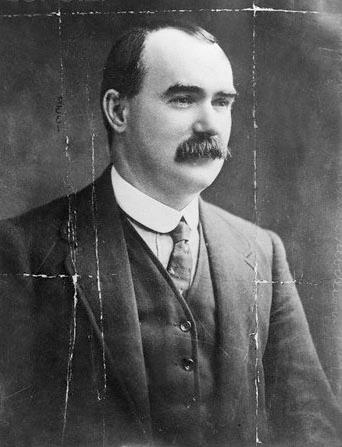Broadcasting from the top of the Carpenter's Union Hall in Butte, Montana. gm@butteamericaradio.org
The Harp Without the Crown – James Connolly

“Socialists did not promise to free the working people, they only wanted to tell the people how to free themselves.”
Quotation from James Connolly in his address made at the Butte Auditorium on April 7,1910.
Hello, this is John Conlan, host of The Rocky Road to Dublin here on KBMF, and welcome to this episode of the Harp Without the Crown, where I will be discussing James Connolly’s visit to Butte on April 6-7, 1910.
James Connolly founded the Irish Socialist Republican Party (ISRP) in 1896. He served as editor and publisher of the Workers Republic which was Ireland’s first Socialist newspaper and The Harp, a New York based Socialist newspaper. He organized the Irish Citizens Army to defend striking workers during the 1913 Dublin Lockout and managed the Irish Transport and General Workers Union with James Larkin. Six years after his Butte visit, he led the Dublin 1916 Easter Rising where the Proclamation for Irish Independence was read from the Dublin General Post Office (GPO). He suffered severe wounds during the Rising and was sentenced to death by the British Government upon capture. His severe wounds made it impossible to walk, which required a firing squad to execute him while seated in a chair in the courtyard of the Dublin Kilmainham Jail.
Connolly arrived in Butte April 6,1910 to discuss the success of the Socialist Party in Ireland and its accomplishments. He was interested in promoting industrial trade unionism and took every opportunity to discuss its benefits. Unlike previous Irish independence activists featured in this series, the main goal of Connolly’s American tour was to erase the prejudice against Socialism among Irish Americans and discuss the worldwide plight of the worker.
His talk was mentioned by the Butte Miner headline, “Noted Irish Socialist Will Be At the Auditorium This Evening,” which was followed by a brief biography of Connolly and that the free program would begin at 7:30. The Butte Daily Post noted he “has been warmly received by his friends and no Irish Socialist is better known.” A small to fair sized audience was noted, depending upon the newspaper source.
It seemed only fitting that future Socialist Mayor, L.J. Duncan, would provide the introduction at the Auditorium on April 7th. Connolly’s speech stressed the goal of Socialism was not a promise to free the working man but to give instruction concerning how to gain better working conditions and improve the quality of life. He detailed how Socialism in Ireland was attempting to improve conditions and he listed its accomplishments, especially the fact that Protestant and Catholic workers were united in obtaining workers rights and good wages where, “there is promise the yoke of landlords will be thrown off.” He then discussed the right of workers to organize, the dangers of scab labor, corrupt capitalist class controlled legislative and judicial bodies, and the loss of workers rights under capitalism. He went on to compare the plight of the American worker as worse off than Black slaves before the Civil War.
Connolly directed critical remarks toward the Catholic Church, which he believed stood for the established order and aided the governing class to keep the labor classes apart. He stated that the Church had ”opposed every Nationalist movement in Ireland during the years 1798, 1848, and 1897.” Connolly wanted to use some of his Montana trip to confront Helena Bishop Carroll concerning the Bishop’s attempts to keep Catholics out of the Socialist movement, which he viewed as an infraction of the political rights of Catholics.
Connolly’s reception and impact on the Butte Irish community wasn’t widely reported, as was the case when Eamon DeValera or Constance Markievicz visited Butte in later decades. Unlike these two Irish heroes, Connolly was not subject to an enthusiastic Butte welcome. There is no record of a parade or grand reception by the city’s political or social leaders. However, he did contribute greatly to the discussion of trade unionism and undoubtedly his message resonated with the Butte Socialist community. His presence was another important voice in Butte’s storied labor history.
Ironically, his death six years later as a result of the 1916 Easter Rising, elevated him to hero status and possibly had a more memorable impact on the Butte Irish than his 1910 visit. Butte Irish organizations, such as the Robert Emmet Literary Association, memorialized the Easter Rising heroes, such as Connolly each year. Also, his brutal death at the hands of the British government galvanized Irish and Irish American opinion against the popular conservative legislative course of action to achieve Irish independence. Among these populations, there began to be more acceptance of other actions, such as armed rebellion, as a way to obtain independence from England. Many were starting to positively view Connolly’s suggestion to “hold on to your rifles.”
Connolly’s Butte’s visit may have had a huge impact on Irish labor history. He left Ireland to visit America when the Irish Socialist Party’s narrow focus was consumed with contesting local elections. Butte and other American mining towns showed him the benefits of organizing one big union and the effectiveness of the general strike. This approach expanded the focus and direction of the Irish Socialist Party. He would return to Ireland to put this knowledge to good use in the Dublin Lockout of 1913.
This is John Conlan and thanks for listening to this episode of the Harp Without the Crown.

You must be logged in to post a comment.